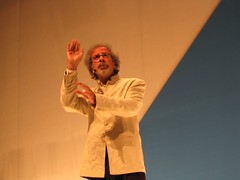 Itay Talgam (photo: Frank Hamm)
Itay Talgam (photo: Frank Hamm)
Last week I got an insightful lesson from someone I'd never heard of before. His name is Itay Talgam, and he used to conduct the Israel Philharmonic Orchestra.
He was the keynote presenter on the opening night of a business conference … and somewhat surprisingly his message was about leadership.
Some people take the word "conductor"
and assume it means "leader." However,
taken a different way, "conductor" might
mean "connector."
Neither is "right," but which would you consciously choose for it to mean for you, your business, or your trading?
To figure out what conductors do, we watched some videos of well-known conductors conducting their orchestras.
- Some were the center of attention, some helped highlight the performers, while others focused on connecting the audience to the music.
- Some were stiff, others almost danced with their orchestra and the audience.
- Likewise, some were control freaks who micro-managed every nuance of a performance, while others simply let the orchestra play.
- Some showed passion; others showed control.
Again, there are countless variations; and the point is that it was easy for each of us to choose what seemed right (and what didn't). Obviously, this works as a metaphor for business, interactions with people, or even how you trade and manage a portfolio.
If you were hiring a conductor, what would you be looking for, and how would you want them to engage ?
With that in mind (time for a little introspection), how do
you show-up, and what do you do? Are there other ways for you to perform your roles and duties that might get better results?
For some ideas, here is his TED Talk.
On a different topic, when you experience great classical music … who should get the credit?
Acceptable answers might include the conductor, the orchestra, the composer, even the audience.
Assuming that a conductor should get their fair share of the credit and blame for a performance, what do they do (or what could they do) to impact the results?
Obviously, the conductor is the focal point letting people know when to do the thing that they do. So there's clearly a communication and coordination component. Taken too far, and it strips some of the "magic" from the performers and the performance.
According to Talgam, the best conductors manage the process, while leaving the details to the performers. This allows them a fair bit of control, without the stifling effect on innovation or art.
From my perspective the same is true in trading. I don't want a portfolio manager to be the trading system … instead I want a dynamic and adaptive selection of the right systems at the right time.
Less Is More.
One of the examples was that a flute player asked the conductor how they would know it was time for them to come in … The conductor's answer was "it's time to come in when you can no longer stand being out."
Leonard Bernstein
was shown as an example of a great conductor. After working with the Vienna Philharmonic for many years, some of the best performances occurred while he did apparently little.
Upon closer inspection, you could see that he was sending them cues using: facial expressions, the pace of his breathing, a nod of his head, the movement of his body, the direction of his gaze, and through countless
other little things.
Obviously, you can't rely on such things at the beginning, but once people really know what to do, one of the best things you can do is help them find opportunities to do what they do best, and then to get out of the way to let them do it.
Here is a link to Talgam's website.



Itay lined up this topic in very interesting and light manner! It is challenged topic because this intrigue to understand value and trends of modern leadership constantly changes. To line up orchestra conducting talent with ability to lead in general is something that should be considered even if we as a community trying to ‘produce’ talents in Music Academies or any other Classical Music schools. No question – leadership and conducting – there are similarities indeed!
I have newer thought that you could compare Karajan with Kleiber but at the end this comparison seems very logical to me.
Thanks for share this useful information. I will recommended it to everyone that is looking towards to become an influential person specially in orchestra conducting field.
Best,
Rihards Buks
Thanks. Glad to hear that from a conductor, like you.
A conductor I know and admire, Timothy Russell, founding music director for 25 years of ProMusica Chamber Orchestra, teaches that the style of the conductor is important, and so is the consistency. (Dr. Russell’s Ph.D. thesis compared the conducting styles of major conductors to the management styles of major CEOs.)
If the musicians know what leadership they will face, because the conductor’s personality is predictable, it doesn’t matter so much whether the conductor or CEO is, for example, nice or mean. But volatility on the podium — or in the CEOs office — hinders the performance of subordinates. Predictably mean (or nice, etc.) works best. It’s the predictability that counts.